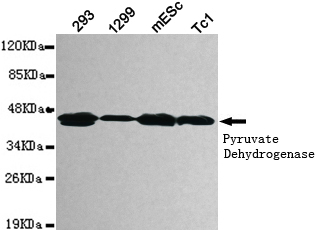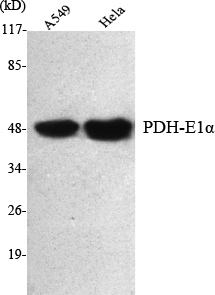PDHA1 Polyclonal Antibody
- Catalog No.:YT3641
- Applications:WB;IHC;IF;ELISA
- Reactivity:Human;Mouse;Rat
- Target:
- PDHA1
- Fields:
- >>Glycolysis / Gluconeogenesis;>>Citrate cycle (TCA cycle);>>Pyruvate metabolism;>>Metabolic pathways;>>Carbon metabolism;>>HIF-1 signaling pathway;>>Glucagon signaling pathway;>>Central carbon metabolism in cancer;>>Diabetic cardiomyopathy
- Gene Name:
- PDHA1 ODPA
- Protein Name:
- Pyruvate dehydrogenase E1 component subunit alpha somatic form mitochondrial
- Human Gene Id:
- 5160
- Human Swiss Prot No:
- P08559
- Mouse Gene Id:
- 18597
- Mouse Swiss Prot No:
- P35486
- Rat Swiss Prot No:
- P26284
- Immunogen:
- The antiserum was produced against synthesized peptide derived from human PDHA1. AA range:314-363
- Specificity:
- PDHA1 Polyclonal Antibody detects endogenous levels of PDHA1 protein.
- Formulation:
- Liquid in PBS containing 50% glycerol, 0.5% BSA and 0.02% sodium azide.
- Source:
- Polyclonal, Rabbit,IgG
- Dilution:
- WB 1:500 - 1:2000. IHC 1:100 - 1:300. ELISA: 1:40000.. IF 1:50-200
- Purification:
- The antibody was affinity-purified from rabbit antiserum by affinity-chromatography using epitope-specific immunogen.
- Concentration:
- 1 mg/ml
- Storage Stability:
- -15°C to -25°C/1 year(Do not lower than -25°C)
- Other Name:
- PDHA1;PHE1A;Pyruvate dehydrogenase E1 component subunit alpha; somatic form, mitochondrial;PDHE1-A type I
- Observed Band(KD):
- 43kD
- Background:
- The pyruvate dehydrogenase (PDH) complex is a nuclear-encoded mitochondrial multienzyme complex that catalyzes the overall conversion of pyruvate to acetyl-CoA and CO(2), and provides the primary link between glycolysis and the tricarboxylic acid (TCA) cycle. The PDH complex is composed of multiple copies of three enzymatic components: pyruvate dehydrogenase (E1), dihydrolipoamide acetyltransferase (E2) and lipoamide dehydrogenase (E3). The E1 enzyme is a heterotetramer of two alpha and two beta subunits. This gene encodes the E1 alpha 1 subunit containing the E1 active site, and plays a key role in the function of the PDH complex. Mutations in this gene are associated with pyruvate dehydrogenase E1-alpha deficiency and X-linked Leigh syndrome. Alternatively spliced transcript variants encoding different isoforms have been found for this gene.[provided by RefSeq, Mar 2010],
- Function:
- catalytic activity:Pyruvate + [dihydrolipoyllysine-residue acetyltransferase] lipoyllysine = [dihydrolipoyllysine-residue acetyltransferase] S-acetyldihydrolipoyllysine + CO(2).,cofactor:Thiamine pyrophosphate.,disease:Defects in PDHA1 are a cause of pyruvate decarboxylase E1 component deficiency (PDHE1 deficiency) [MIM:312170]. PDHE1 deficiency is the most common enzyme defect in patients with primary lactic acidosis. It is associated with variable clinical phenotypes ranging from neonatal death to prolonged survival complicated by developmental delay, seizures, ataxia, apnea, and in some cases to an X-linked form of Leigh syndrome (LS) (Leigh encephalomyelopathy).,disease:Defects in PDHA1 are the cause of X-linked Leigh syndrome (LS) [MIM:308930]. LS is an early-onset progressive neurodegenerative disorder with a characteristic neuropathology consisting of focal, bilateral lesions in o
- Subcellular Location:
- Mitochondrion matrix.
- Expression:
- Ubiquitous.
- June 19-2018
- WESTERN IMMUNOBLOTTING PROTOCOL
- June 19-2018
- IMMUNOHISTOCHEMISTRY-PARAFFIN PROTOCOL
- June 19-2018
- IMMUNOFLUORESCENCE PROTOCOL
- September 08-2020
- FLOW-CYTOMEYRT-PROTOCOL
- May 20-2022
- Cell-Based ELISA│解您多样本WB检测之困扰
- July 13-2018
- CELL-BASED-ELISA-PROTOCOL-FOR-ACETYL-PROTEIN
- July 13-2018
- CELL-BASED-ELISA-PROTOCOL-FOR-PHOSPHO-PROTEIN
- July 13-2018
- Antibody-FAQs


